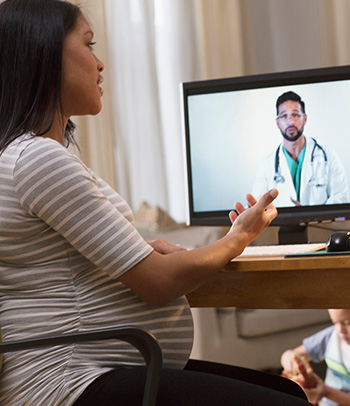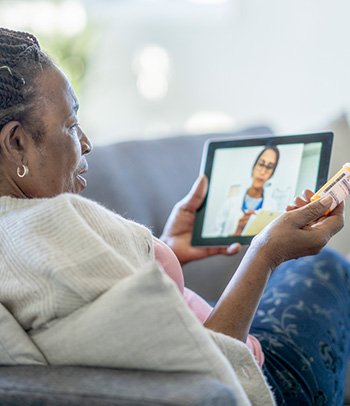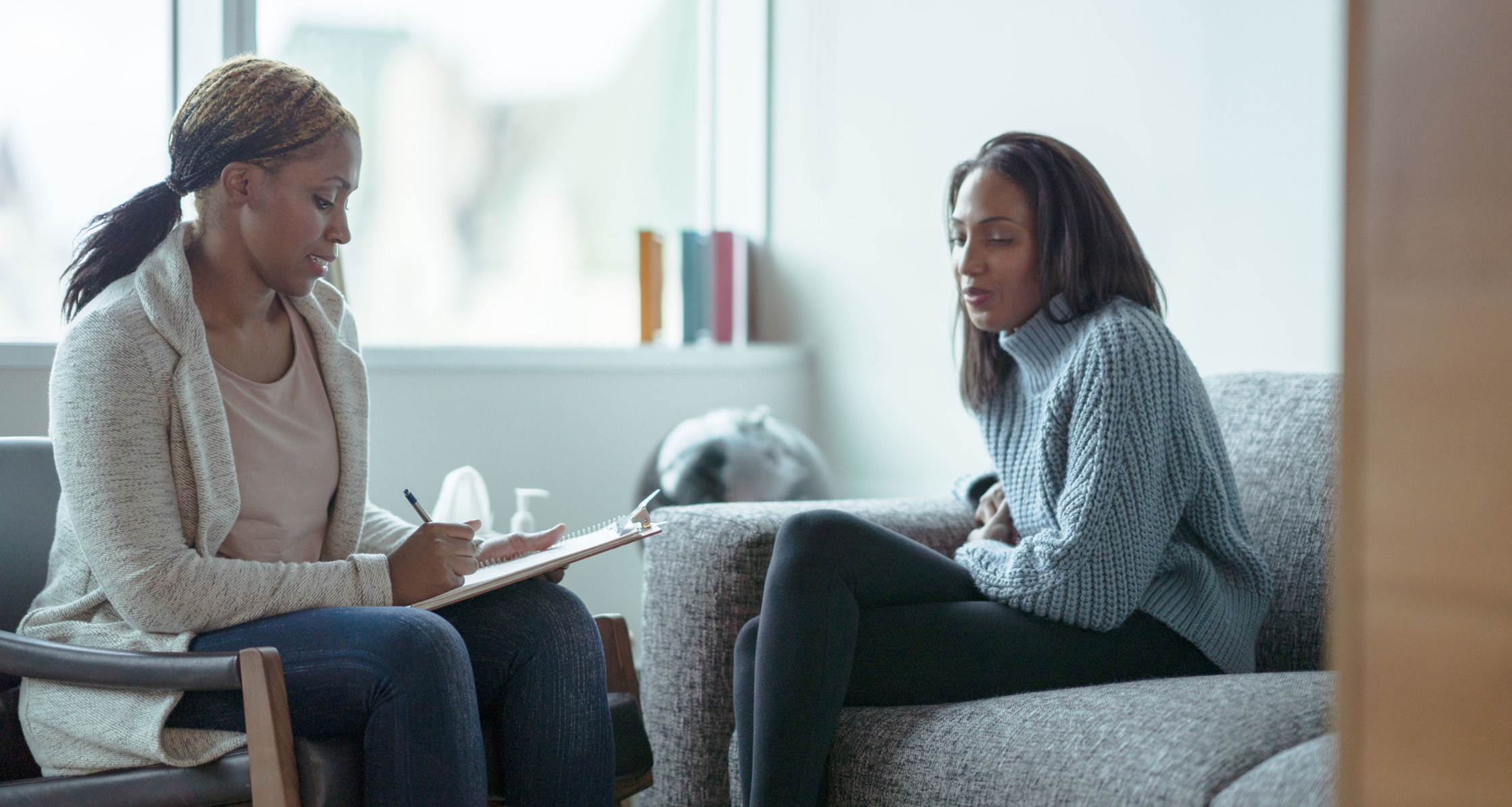Depression is a treatable medical condition that affects women almost twice as much as men.
Life is full of ups and downs, full of moments of joy and happiness, alongside moments of sadness and grief. Maybe you’ve had times when you’re down for a few days after getting into an argument with a coworker or gaining a few unwanted pounds. Or maybe you’ve experienced extreme sadness after the loss of a loved one or a difficult divorce. These are normal reactions to tough life experiences, but when you suffer from depression, there’s more to it.
If you feel sad or hopeless most of the time, and those feelings are keeping you from your regular activities or caring for yourself or others, you may be suffering from depression.
Depression is a treatable medical condition that affects women almost twice as often as men. Learn more about depression, its symptoms, how it affects women and what resources are available to help you manage it.
What Is Depression?
Depression is a serious mood disorder that can affect how a person feels, thinks and acts. It often impacts your ability to work, go to school, have relationships with friends and family, and go about your daily life. It can affect the way you eat and sleep.
Here are some important things to remember about depression:
- Depression is different than feeling sad or down for a few hours or a few days. It’s different from grieving after a loss or experiencing a difficult event. A diagnosis of depression often involves feeling sad, empty or hopeless for at least two weeks.
- Depression is common. According to the Department of Veterans Affairs (VA), it is the most common mental health diagnosis among women Veterans.
- Depression is not something you’ve caused by something you did or didn’t do.
- Depression is not something you can just “snap out of.”
- Depression is treatable and support is available.
What Types of Depression Are Most Common Among Women?
Anyone can become diagnosed with depression (which is also called major depression or clinical depression), but depression is especially common among women.
Certain types of depression in women are associated with physical and hormonal changes that occur at specific stages of a woman’s life such as during menstrual cycles, pregnancy, postpartum and perimenopause.
- Premenstrual dysphoric disorder – This is a more intense form of premenstrual syndrome (PMS) that occurs in the weeks before menstruation. It causes severe symptoms such as depressed mood, anger or irritability, suicidal thoughts, appetite changes, breast tenderness, and joint and muscle pain.
- Perinatal depression – This occurs during pregnancy or after childbirth (after childbirth, it’s also called postpartum depression), and it’s more than the “baby blues” that many women experience after giving birth. Symptoms last for more than just a few days and may include extreme sadness, anxiety and fatigue that make it difficult to carry out daily tasks, care for yourself or build a connection with your baby.
- Perimenopausal depression – This affects some women during the transition to menopause. Common symptoms of menopause include abnormal periods, mood swings, hot flashes and problems sleeping, but perimenopausal depression causes more extreme feelings of irritability, anxiety and sadness.
Other types of depression that aren’t related to a particular hormonal change or time in a woman’s life that can impact anyone may include seasonal affective disorder, depressive episodes connected to a bipolar diagnosis, dysthymic disorder, and psychotic depression.
What Causes Depression?
There is no single cause of depression. According to the Office on Women’s Health, there are many reasons a woman may have depression – often involving a unique combination of genetic, biological, environmental and psychological factors.
- Family history – If you have a family history of depression, you may be more at risk of developing it.
- Brain changes and chemistry – When you have depression, your brain looks and functions differently than someone who doesn’t have depression. Parts of the brain that manage mood, thoughts and behavior might not have the right balance of chemicals.
- Hormone levels – Changes in your hormones during your menstrual cycle, pregnancy, postpartum period, perimenopause and menopause may all raise your risk of depression.
- Stress and trauma – Serious life events such as losing a loved one, a bad relationship, the work of caring for children and aging parents, abuse, sexual assault, poverty and more may trigger depression in some people.
- Medical problems – Dealing with a serious health problem such as a stroke, cancer or a heart attack may trigger depression.
- Pain – Women who feel emotional or physical pain for long periods of time are more likely to develop depression. This pain can come from chronic health conditions, an accident or a trauma such as a sexual assault.
What Are the Symptoms of Depression?
Depression looks different in everyone. There aren’t one or two symptoms that define everyone’s experience with depression, but many people experience some of the symptoms listed below. Some people may only experience a few symptoms, whereas others may experience several symptoms at once. How long they last and how severe they feel can be different for everyone.
Signs or symptoms of depression often include:
- Anxiety or irritability
- A sad, empty mood
- Feelings of hopelessness, helplessness or worthlessness
- Loss of interest in hobbies and activities that you once enjoyed
- Fatigue, decreased energy
- Difficulty concentrating, staying focused, remembering or making decisions
- Changes in sleep, such as insomnia or oversleeping and not wanting to get up
- Changes in appetite, such as a lack of appetite or eating more to feel better
- Constant physical aches and pains that do not have a clear physical cause and don’t go away with treatment, such as headaches, body aches or an upset stomach
- Thoughts of hurting yourself, death or suicide
For a diagnosis of depression, these symptoms would be recurring or occurring every day for at least two weeks. Symptoms of depression may make it hard to think, work, sleep, eat and enjoy your life and those around you.
Can Depression Be Treated?
Yes. Depression is treatable. You don’t have to live with these symptoms, and treatment can make you feel better.
To begin, talk to your health care provider about your feelings or any symptoms you have been experiencing. VA offers a depression screening to help you learn more about your symptoms that you can share with your health care provider.
Your health care provider can talk to you about treatment options for depression, which often include antidepressant medications, therapy or a combination of both. There is no “one size fits all” treatment when it comes to depression. It may take some trial and error to find the right combination of medication and therapy that works best for you.
In addition, alternative or complementary treatments may help some people manage depression symptoms. For example, some research suggests that regular exercise, meditation or yoga may help you lower your risk of getting depression and may help you manage your symptoms.
You and your health care provider, along with a mental health professional, can work on a treatment plan that addresses your symptoms and gives you the relief you deserve.
What Resources Are Available to Help Treat My Depression?
If you or someone you know is in crisis, call the Veterans Crisis Line. Dial 988 and press 1. You can call, text or chat online with qualified VA responders 24/7.
VA and its community partners want to ensure that women Veterans receive the care they need for depression.
- VA has Women’s Mental Health Champions at every VA medical center. These champions are mental health clinicians with specific training, interest and expertise in women Veterans’ mental health care. VA also offers access to peer specialists. These specialists are Veterans who have experienced and recovered from a mental health condition. They can help you access local resources, find meaningful activities in your community and much more.
- VA offers treatment, services and support related to depression. Learn more about the use of evidence-based therapies and treatments. You can receive care for depression at VA medical centers, community-based clinics, Vet Centers or through telehealth options.
- VA also offers services and support related specifically to pregnancy and mental health, including resources for postpartum depression.
- VA has several apps that support mental health. Find apps related to managing stress, coping with military sexual trauma, improving your relationships and much more.
- Make the Connection provides stories from Veterans who have overcome depression and other mental health challenges. Find stories on depression, military sexual trauma, post-traumatic stress disorder and much more.
Depression is a common and treatable medical condition. Give yourself the support, and get the treatment you deserve, so you can get back to feeling like yourself again.







